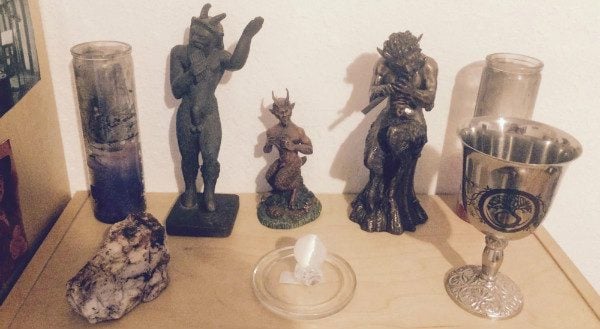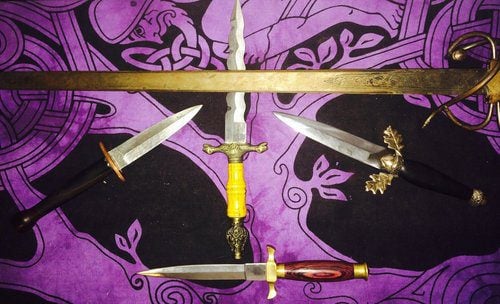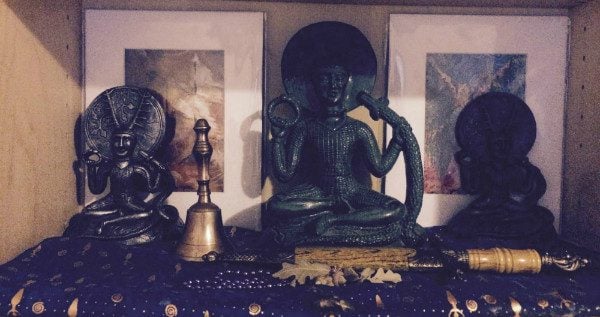I feel a bit guilty saying this, but there’s a lot of the stuff in my ritual room that was made in China. I’m sure most of you are in a similar position too. As an American living in the year 2015 it’s very hard to avoid items from overseas. So much of what we own today comes from third-world countries and that includes many magical and occult items.
Most of my deity statues come from China and several ritual tools as well. I try to avoid such things but when I find a bell I like at the metaphysical store my first thought isn’t always “I wonder where this was made?” Usually it’s more like “that’s not too expensive and it sounds great!” I like to support local artisans and a great deal of what I own comes from those folks, but sometimes I need a thing in a hurry, or I just like something (dubious origins be damned!).
Where (and from whom) we buy our things is often a touchy subject. Many people actively avoid sweat-shop labor and the big-box stores that sell those wares. I’m generally one of those folks. I don’t shop at Wal-Mart and I will pay extra for an item made in the United States or where workers are paid a living wage. But I also try not to be too overly judgmental when someone picks up the majority of their working tools from the Dollar Store. Someone may have very good reasons for shopping there, and I just don’t feel like it’s my place to criticize another for such a thing.
Finding the middle ground between “Capitalist Witch Destroyer of Rain Forests” and “I Made It All On My Own Out of 100% Recycled Organic Materials” is challenging, but I think it can be done. It’s all about prioritizing what’s most important and making sure you still have money to pay the rent. Try to focus on what you need for ritual instead of what you want. Resist the urge to buy a .99 cent chalice at the dollar store and instead buy a much more magical chalice when you can afford it later.
 If it’s a magical tool you are going to use for awhile, invest some money in it. For many Witches a working tool is for life, and if you are buying something that you are going to use for the next 50 years you might as well spend more than fifteen dollars on it. The majority of my working tools (not spell supplies, but working tools) are from local artisans and craftspeople.
If it’s a magical tool you are going to use for awhile, invest some money in it. For many Witches a working tool is for life, and if you are buying something that you are going to use for the next 50 years you might as well spend more than fifteen dollars on it. The majority of my working tools (not spell supplies, but working tools) are from local artisans and craftspeople.
While writing The Witch’s Athame I spent a lot of time thinking about working tools and the proper ways to obtain them. For most of us it’s probably impractical to forge our own sword or athame, but that doesn’t mean we have to buy a knife made in an overseas sweatshop. A little over a year ago I replaced my my “Made in China” athame with one hand crafted in the United States. One was considerably more expensive than the other (180 dollars versus 35), but the new athame was also exactly what I wanted in a knife. In addition it simply “felt better” in my hand.
Two hundred dollars is a lot for an athame, but since I plan to live another forty years it only adds up to a few dollars a year, and most importantly I know what went into its making. There was no child labor involved, or people being paid a dollar an hour to make my magical tool. Think about it, when we don’t know where our tools come from we have no idea what energies went into their creation. My old athame never hummed of doom, but not knowing what it was made from always bothered me. That’s not the case with my new one.
If it’s worth putting on your altar for the next ten years it’s worth investing in. I know that sometimes you just need something in a hurry, and I know many fine Witches with fifteen dollar blades that say “Made in Pakistan,” but if you can invest do so. Your tools will be all the better for it. (And yes, you can grow to love your fifteen dollar blade, and if you do so, don’t let anyone tell you that’s wrong!)
If you have to buy something of dubious quality, buy it locally, especially from a local Witch Store. It’s so easy to just buy things online, and that’s great if you happen to own Amazon stock, but you probably don’t. You’ll be doing local business and your local Pagan Community a favor if you can make your purchases at a local shop or festival. Yes, you’ll probably have to pay a few dollars more for it, but it will smell like incense when you get it home.
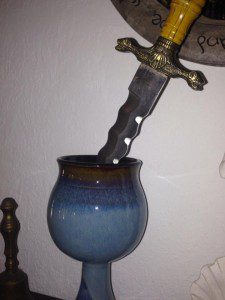 Seriously, until very recently Witch Shops were like our local internet, it’s where we went to meet one another. Many of them still serve that function and host book signings and workshops. Even if you don’t want to participate in that stuff, by shopping at your local Witch Store you are helping other Pagans find an “in” to the local scene. If your local shop is run by good folks the energy in the shop will help cleanse whatever you buy from it. If there’s not a local store in your area, find a “local” store online. It still beats buying from a big box. (And Amazon seems like a nice bunch of folks, but that’s not always the case.)
Seriously, until very recently Witch Shops were like our local internet, it’s where we went to meet one another. Many of them still serve that function and host book signings and workshops. Even if you don’t want to participate in that stuff, by shopping at your local Witch Store you are helping other Pagans find an “in” to the local scene. If your local shop is run by good folks the energy in the shop will help cleanse whatever you buy from it. If there’s not a local store in your area, find a “local” store online. It still beats buying from a big box. (And Amazon seems like a nice bunch of folks, but that’s not always the case.)
One more word of advice, if you buy an altar tool but can’t see yourself wanting to use it in a year’s time leave it on the shelf. Tools should always be an investment, not just a matter of expediency.
Some stuff you want is just going to be made overseas. I like statues, sadly most of my statues are made in China. On the plus side they are all designed by people in the United States and Europe, and those people are generally Pagans, but they are still manufactured in questionable conditions. All of my statues are coming from Witch stores and on two ends I’m helping my local Pagan economy, but . . . . Making these kind of decisions is tough, but there’s a part of me that just needs a lot of Pan statues.
Many of the statues and wall hangings found in Witch Shops are made overseas, and they still cost a pretty penny. Even with the “Made in China” stamp on most of them, they all end up being things I would call “investments. On the plus side if the artist is a Pagan I know that the work is probably coming from a good place spiritually. I’d rather live in a world with some statues from my favorite artists (even if they are made in China) than not have those things.
If you can buy something used, do it! There is absolutely nothing wrong with a used tool or magical item. In fact, some of my favorite working tools are things I’ve inherited from others or found secondhand over the years. Sure, you’ll probably need to cleanse whatever used item you buy (or are given) but that should be done with all your tools anyways. Unless it feels like burning when you pick it up, that used tool is most certainly just fine. You can even buy “used” candles at places like Goodwill, don’t let that stuff go to waste, give it a home and put it to work! Yard sales are also worth a look as well, and if you’re lucky, maybe a local Pagan group sponsors one now and then!
Craft and Art Fairs feel like Witchcraft boutiques. Over the years my wife and I have bought two chalices (and they are our favorite chalices), a broom, several statues, and a pentacle (since retired) at area craft and art fairs. All of those things were made in the United States and didn’t cost all that much. The chalices were probably the most expensive at twenty five dollars each, and we’ve each had those chalices for over ten years now. Local art/craft fairs are a treasure trove of Pagan things. I can’t recommend them enough. You might even be surprised at what you find in the corners of your local Farmer’s Market. (Soap that makes me smell like a New Age store!?! Yes please!)
If you have to go cheap, go semi-cheap on spell supplies. My candles come from Ikea. I wish they were all made out of beeswax from 100% PETA-friendly bees but I just can’t afford that. Sometimes sacrifices must be made. All that being said, my Ikea candles aren’t that bad. Sure, they probably aren’t 100% natural (though the package does say “natural”) but they do at least burn cleanly. (Non-scented and clean burning are the best for indoor rituals, most scented candles have artificial stuff in them.)
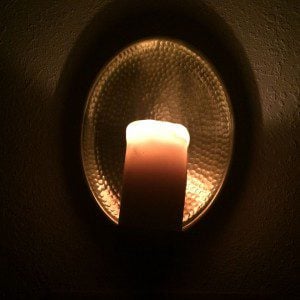 I’ve used the dollar store candles before, and they are sooty and I’m rather sure the “wax” is 100% petroleum, no thank you. When it comes to things like candles you do get what you pay for and it’s best to invest at least a little bit in them. Most of us will probably not be burning beeswax candles at Lammas, but you can probably do better than the cheapest candles available at Wally World or whatever. Most Witch Stores offer relatively cheap candles in all sorts of colors, and they all burn a whole lot better than the dollar store alternatives.
I’ve used the dollar store candles before, and they are sooty and I’m rather sure the “wax” is 100% petroleum, no thank you. When it comes to things like candles you do get what you pay for and it’s best to invest at least a little bit in them. Most of us will probably not be burning beeswax candles at Lammas, but you can probably do better than the cheapest candles available at Wally World or whatever. Most Witch Stores offer relatively cheap candles in all sorts of colors, and they all burn a whole lot better than the dollar store alternatives.
Spell work shouldn’t be all that complicated. If you find yourself needing to buy twenty five dollars worth of “stuff” at the dollar store you are probably over thinking it. Sometimes some fire, a pen, and a piece of paper work just fine.
Use What You Have. A whole lot of tools and spell supplies are already sitting in your kitchen. Don’t have a chalice? Use a wine glass or even a plastic cup from the cupboard. You don’t need bottled “spring water” for your rite, tap water works just fine. It’s cool to use salt from an ocean, but regular salt also does the job too. No one needs a special plate for cakes and ale when there are plates already in your kitchen. It’s best to use what have you to start, and then gradually replace those thing with quality items if you want the dedicated altar set up.
Avoid the knick-knacks. In a lot of rituals you tend to leave with something, and it’s a trope I use too, but unless it’s absolutely vital to your ritual try to skip this part. Most of us don’t need another cheaply made plastic thing. I can survive on just the memories of the experience, and everyone else can too. One of my local public groups always passes out a token at the end of ritual, but how many things on a plastic chord do I need? We’ve got to come up with better alternatives.
I would love a completely organic “Made in the USA” set of working tools and statuary, but it’s probably not ever going to happen. What I do try to do is balance things out, buying as much as I can “closer to home” and filling in the blanks as needed. Taking the small steps


